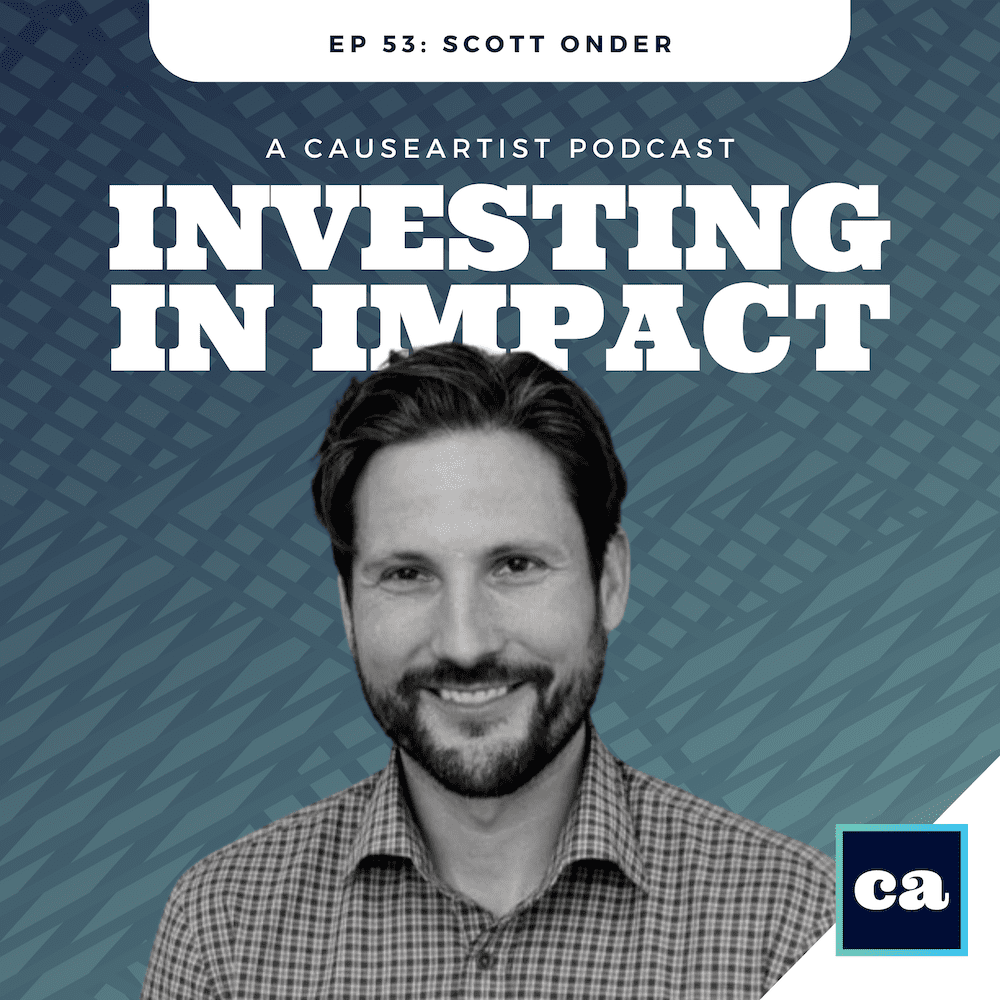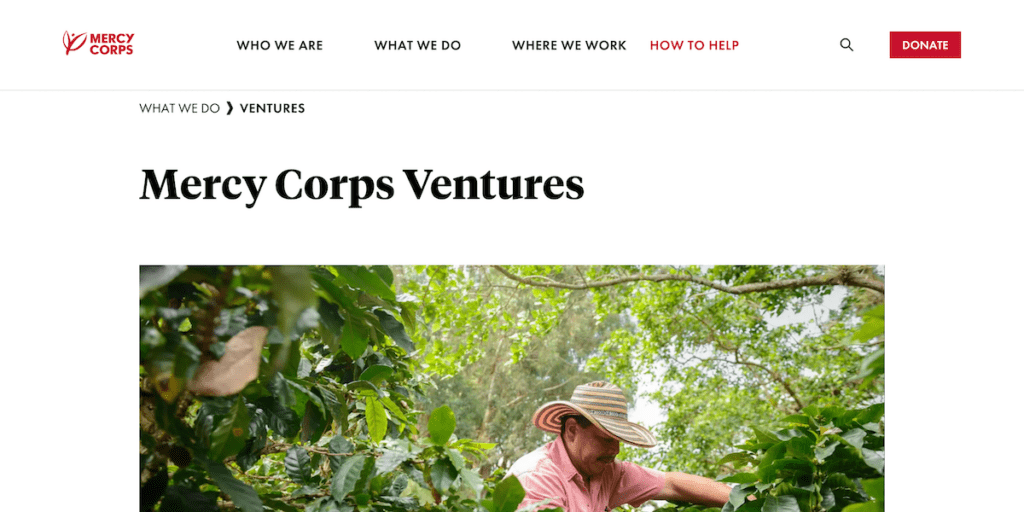In Episode 53 of the Investing in Impact podcast, we speak with Scott Onder, Co-Founder and Senior Managing Director of Mercy Corps Ventures, on investing in and promoting venture-led solutions to enhance the resilience of underserved communities and individuals.
- Subscribe on Apple Podcasts
- Subscribe on Spotify
About Scott
Scott Onder is the Chief Investment Officer at Mercy Corps, where he oversees the agency’s global strategy for impact investing, innovative finance, Web3 initiatives, and strategic partnerships with technology ventures.
He is also a Co-Founder and Senior Managing Director of Mercy Corps Ventures, the venture capital arm of Mercy Corps.
The firm focuses on investing in high-impact startups that develop inclusive fintech, climate resilience, and Web3 solutions in frontier markets.
Under Scott’s leadership, Mercy Corps Ventures has invested in 43 seed and early-stage ventures across Africa, Latin America, and Southeast Asia.

Apart from providing capital, the firm offers strategic support, pilot programs, and partnership opportunities to help startups scale their businesses.
As an early investor in Wasoko, Goldfinch, Pula, and Ejara, Scott serves on the boards of portfolio companies that drive financial and climate resilience.
He is also an active advisor and angel investor in emerging crypto protocols. Scott is a magna cum laude graduate of Duke University and is based in the Pacific Northwest.
About Mercy Corps Ventures
Mercy Corps Ventures is a venture capital firm that focuses on investing in and promoting venture-led solutions to enhance the resilience of underserved communities and individuals.
Since its establishment in 2015 as the impact investing arm of Mercy Corps, the firm has facilitated the scaling up of 43 early-stage ventures, helping them raise over $396.7 million in follow-on capital.
The firm’s portfolio concentrates on solutions in adaptive agriculture and food systems, inclusive fintech services, and climate-smart systems and tech infrastructure.
Its goal is to enable those living in frontier markets to withstand disruption and plan for the future by catalyzing the ecosystem towards smarter and more impactful investments.

The firm’s focus on supporting underserved groups to participate in the global economy has led to its promotion of emerging decentralized finance (DeFi) solutions that accelerate global financial inclusion.
In partnership with companies, Mercy Corps Ventures responsibly pilots the use of cryptocurrencies and blockchain tools to provide reliable and direct access to financial services for un/underbanked populations.
Mercy Corps Ventures plans to launch Fund II, the Resilient Future Fund, to invest in and support approximately 20 early-stage startups in frontier markets with solutions that build resilience to the accelerating shocks caused by climate change.
Entrepreneurs worldwide are deploying disruptive business models and transformative technologies to address the most significant challenges of our time.
These startups have the potential to reach 3.3 billion climate-vulnerable people, 1.4 billion unbanked people, and 162 million small businesses with innovative climate-focused and digital finance products that could drive their resilience.
However, they often lack sufficient capital and access to resources to ensure their ventures survive and scale.
Interview Transcript
00:00
Host: Thank you so much, Scott, for joining me today. Very excited to chat about your journey and everything you’re doing on the venture side these days with Mercy Corps. Before we dive into everything about Mercy Corps and Mercy Corps Ventures, could you talk a little bit about your career path before Mercy Corps?
00:18
Scott: Absolutely. Thanks for having me. I’m Scott Onder, the Chief Investment Officer of Mercy Corps. Mercy Corps is a global humanitarian aid and development agency operating in over 40 countries with a team of about 6000 people. We work alongside communities facing poverty, conflict, and the climate crisis. My role involves setting the global strategy for our impact investing work, focusing on innovative finance, web3 initiatives, and developing strategic partnerships with technology ventures. I got into this work about 15 years ago, after working in venture capital, investment banking, and real estate finance. I was interested in how emerging technologies like remote sensing devices and fintech could solve global challenges. This led me to explore how digital financial services could bring unbanked people into the global economy, giving them access to bank accounts, savings, and credit.
02:27
Host: You mentioned M-PESA in Kenya. Can you talk more about that?
02:29
Scott: Sure. I first encountered M-PESA in 2008, around the time the first generation iPhone came out. I was consulting on how smartphones could take microfinance to the next level and stumbled upon M-PESA. Digital financial services delivered over mobile platforms seemed like a game changer. By 2014, over 80% of Kenyan households were using M-PESA. This ecosystem spurred startups integrating mobile payments into various solutions. However, these entrepreneurs often lacked access to early-stage capital, so we established a venture capital fund to fill that gap, leveraging our global platform to support these startups.
04:50
Host: Can you talk about some of the companies or startups emerging globally, especially in fintech and web3?
06:01
Scott: Absolutely. Startups in emerging markets benefit from advancing mobile internet, smartphone penetration, and affordable data. Big data and AI are being used to tailor solutions for low-income communities. Energy access is becoming more affordable, and open source, decentralized technologies are leveling the playing field. However, technology alone isn’t enough. Last-mile distribution, integrating education into user experience, and affordability are crucial. Entrepreneurs play a key role in solving these challenges, often better than governments or NGOs. The current global financial system excludes many, and decentralized, open source infrastructure like public blockchains offer a way to bring more people into the financial system.
07:28
Host: How can decentralized finance (DeFi) and web3 solutions benefit emerging markets?
10:35
Scott: DeFi and web3 can increase transparency, enhance efficiency, lower costs, and speed up payments. In crisis response, for instance, using crypto rails can deliver aid more quickly and transparently. We’ve tested this at Mercy Corps and seen its potential beyond humanitarian aid. Remittances were an early use case, making payments more affordable. Stablecoins offer a lifeline in hyperinflationary environments, allowing people to save and receive payments. We’re also excited about regenerative finance, where carbon offsets and projects in emerging markets can be tokenized and traded on blockchains, leading to efficient pricing and new income streams for communities.
14:49
Host: Can you highlight some startups Mercy Corps Ventures has invested in?
18:22
Scott: Sure. We’re a thesis-driven investor, focusing on climate adaptation, resilient solutions, inclusive fintech, and climate-smart technologies. For example, Floodbase is a flood data analytics platform helping insurers and governments assess flood risk using satellite data. Open Forest Protocol addresses challenges in measuring and verifying carbon credits, making it accessible for smaller projects. In the supply chain space, Wasoko is a last-mile distribution platform delivering inventory to small shops in Africa, offering buy now, pay later credit, and stabilizing supply chains.
23:11
Host: How do you source investment opportunities?
23:50
Scott: We source opportunities from Africa, Latin America, and Southeast Asia, embedding our team in vibrant startup ecosystems. Our biggest deal flow comes from entrepreneurs in our portfolio recommending us to others and from investors we’ve co-invested with. We also get referrals from later-stage investors and try to share our learnings publicly to attract more opportunities.
25:39
Host: What does success look like for you in the next three to five years?
26:04
Scott: I’m encouraged by the development of ecosystems we’ve invested in over the last eight years. There are still capital gaps, especially in climate adaptation and resilience. Our focus is to catalyze more capital to address these issues. Success would mean seeing hundreds of billions of dollars invested annually in climate adaptation and resilience solutions for communities in emerging markets, ensuring that those least responsible for climate change are better equipped to handle its impacts.
28:41
Host: Thank you so much, Scott. It’s been an amazing conversation. Best of luck with your work at Mercy Corps Ventures.
Scott: Thank you. I appreciate the conversation and the opportunity to share our work.







